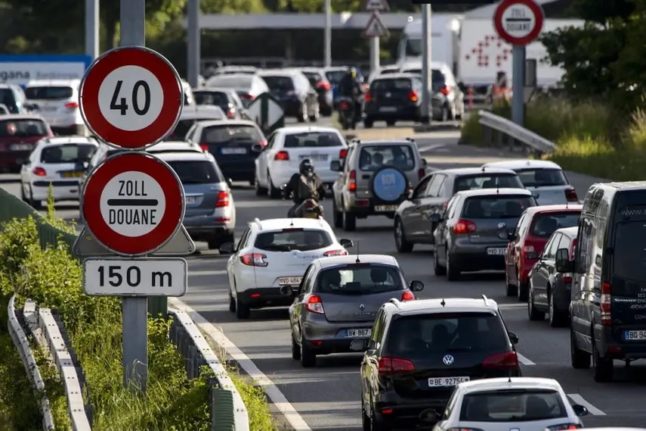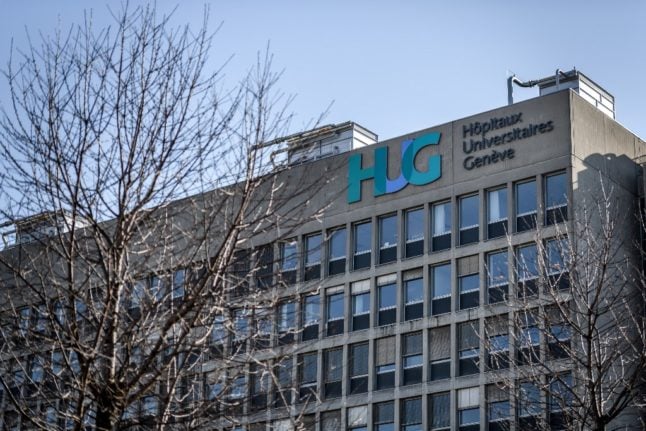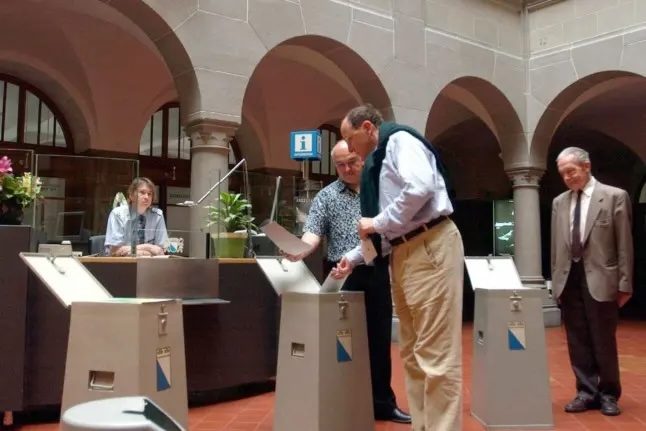Numbers released by the Federal Statistical Office (FSO) on Tuesday indicate that the number of cross-border commuters from neighbouring countries has increased in 2022.
Last year, 380,000 people benefited from a G border permit — 6 percent more than in 2021.
Out of the total number, 56.3 percent of the cross-border workforce resided in France, 23.5 percent in Italy, 17.1 percent in Germany, 2.3 percent in Austria, and 0.2 percent in Liechtenstein.
The FSO also found that about 60 percent of cross-border commuters are concentrated in three Swiss cantons: 27.4 percent in Geneva, 20.4 percent in Ticino, and 10.8 percent in Vaud.
Of the three, the number of cross-border employees (frontaliers in French) has increased the most in Geneva, which shares the border with France’s Haute-Savoie and Ain regions.
Some 7,300 new workers from France were hired during 2022 than the year before.
Geneva’s own statistics, OCSTAT, show that most of these employees were engaged in the hospitality and restaurant sector; wholesale and retail trade; healthcare and social work; as well as in transportation and warehouses.

Many cross-border workers are employed in Geneva’s gastronomy sector. Photo: Pixabay
Historically, cross-border workers have been hired to fill the gaps in the labour market and boost Switzerland’s economy.
However, not everyone sees it this way.
‘Too many inequalities’
Soon after the FSO statistics were released, the Geneva section of the right-wing Swiss People’s Party (SVP), called UDC in French, issued a statement demanding that “Geneva public authorities stop hiring cross-border workers, hiring local residents as a priority.”
“Nearly one in three workers in Geneva is a cross-border commuter and thus replaces Genevans in the occupation of a job in our canton,” the party said.
Another group, Geneva Citizens Movement, has also joined the anti-frontalier movement, calling on the canton’s public establishments not to hire French workers, but to favour local residents, “who are able to better understand the mentalities and customs of the region.”
Others too have pointed out that while cross-border workers may benefit Geneva businesses, it is at the detriment of the ones located across the border in France.
Journalist Fabrice Breithaupt wrote in an editorial piece in the Tribune de Genève (TDG) on Thursday, that the so-called ‘Swiss effect’ — that is, the advantages of working in Geneva and being paid Swiss wages while living cheaper in France — is unfair to those employed across the border “who are paid in euros, and struggle to live and find accommodation in expensive departments because of the ‘Swiss effect’.”
This practice is also unfair “to French employers who, unable to compete against the attractiveness of the salaries offered by their Swiss counterparts, are struggling to recruit,” Breithaupt said.
READ MORE: Why French cross-border workers choose to work in Switzerland
Other sectors in neighbouring France are at a disadvantage as well: “the health system of the French border departments, because of caregivers who have left to work in Switzerland. And French and Geneva municipalities, which are suffocating under the heavy cross-border traffic.”
In all, cross-border workers “generate too many inequalities and socio-economic tensions, and too much environmental nuisance too,” he added.

French cars queue up to enter Switzerland near Geneva, causing bottlenecks. Photo by FABRICE COFFRINI / AFP
‘We can’t do without them’
Cantonal officials, however, insist that cross-border employees are a definite plus for Geneva.
“We clearly cannot do without them,” Fabienne Fischer, who is charge of Geneva’s Department of the Economy and Employment, told TDG in an interview.
“We saw this during the coronavirus pandemic: it was essential to put in place a whole series of exemptions from the health measures to authorise these workers to cross the border and allow Geneva to continue to function,” she said.
READ MORE: Why are cross-border workers exempted from Switzerland’s new travel restrictions?
“Our health system needs qualified personnel from France to function properly,” she added, referring to the fact that 60 percent of nursing staff at Geneva’s university hospitals (HUG) live in France.
“This is also the case in other sectors of activity, such as the hotel and catering industry.”
Fischer said she understands those who bring up Geneva’s own job seekers and argue that they should be given priority over foreign workforce.
However, “several studies have shown that there is no correlation in Geneva between the number of unemployed and the number of cross-border workers,” she pointed out. “In other words, cross-border workers compete very little with Geneva residents.”
The reason is that Geneva’s unemployed are primarily people with little or no professional training, while the frontaliers are hired for positions that “require a highly qualified workforce.”
READ MORE: Who can work in Switzerland but live in a neighbouring country?



 Please whitelist us to continue reading.
Please whitelist us to continue reading.
Member comments